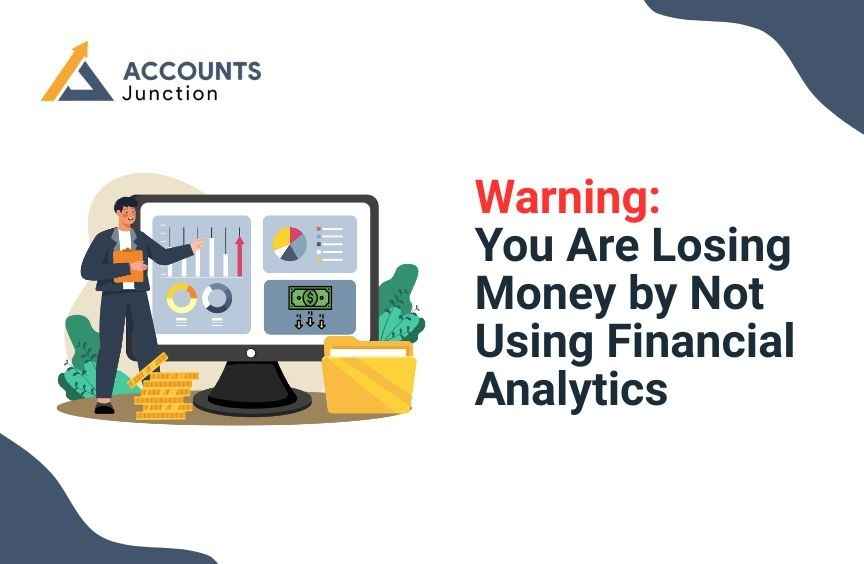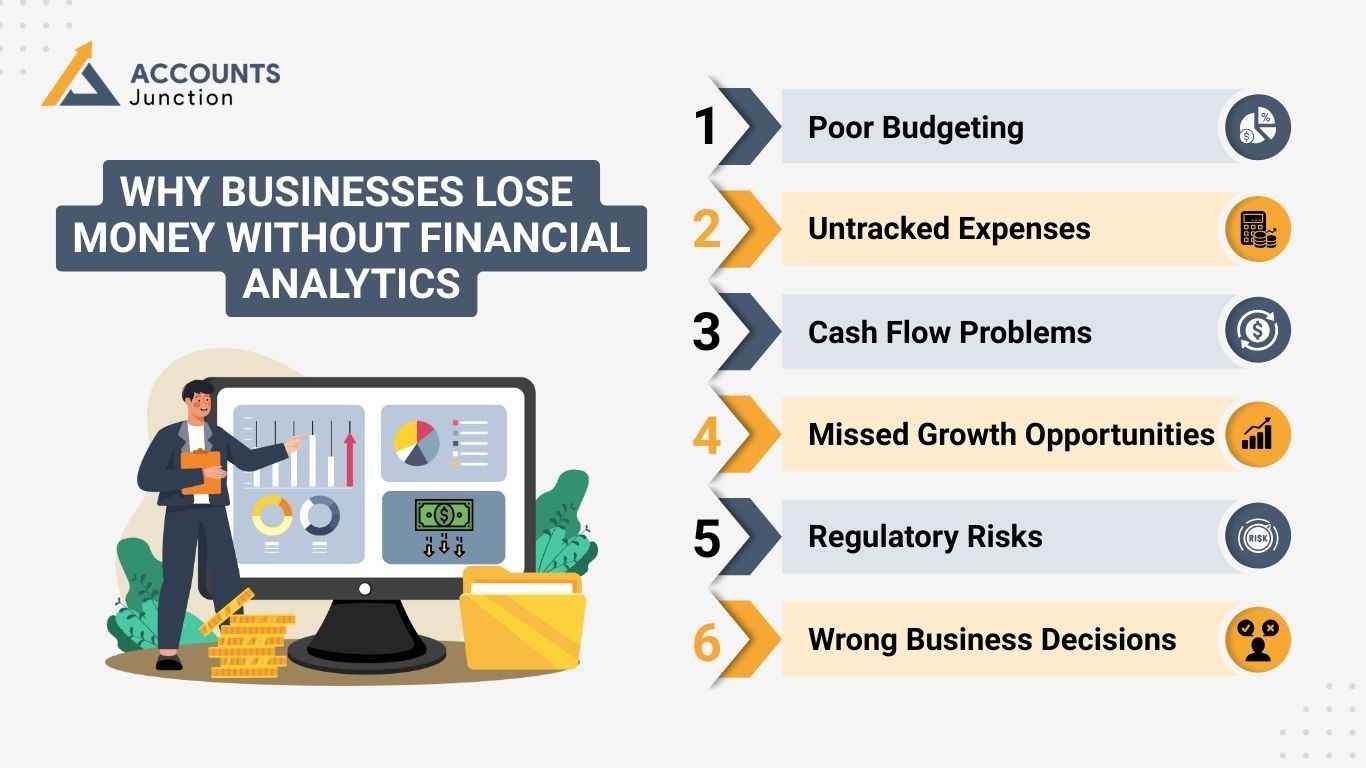
Warning: You Are Losing Money by Not Using Financial Analytics
Running a business involves many financial decisions. These choices can either help you grow or lead to losses. One practice that can make a big difference is using financial analytics. Many businesses still ignore it and end up losing money.
Using financial analytics helps you understand where your money is going. It shows you how to improve profits and manage costs. Use financial data analytics with good financial management software to grow your business. It helps you work smart and see real change.
What Is Financial Analytics?
Financial analytics means looking at your company's data. It helps you find patterns in spending, income, and growth. This helps you make better choices with real numbers.
Unlike basic accounting, financial data analytics looks deeper. It provides clear insights into effective and ineffective areas of your operations. It helps you reduce waste and increase profits. You also become more aware of your cash flow, expenses, and profits.
Why Financial Analytics Is Important
Financial analytics helps you understand where your money goes. It shows what you earn, spend, and save. It helps you make good and informed decisions for your business. It also helps reduce risk and plan for growth. Ignoring financial analytics means missing key insights.
It's like driving without a map. You might move, but you won’t know if you're going the right way.
Businesses that use financial management software along with analytics often grow faster. They can track how their money is being allocated. They can also find areas to cut costs and boost sales.
Why Businesses Lose Money Without Financial Analytics
1. Poor Budgeting
- If you are not using data, your budget is simply a speculation. It may result in spending too much money in one area and not enough in others. Such imbalances can ultimately lead to overspending.
- With financial analytics, you can easily create better budgets. You can look at past data and plan more accurately.
2. Untracked Expenses
- Without proper tracking, small costs can go unnoticed. These small amounts add up over time. You may also end up paying for things you no longer use.
- Financial management software helps you track every dollar. You get reports that show where your money is going.
3. Cash Flow Problems
- It is possible that a profitable business may have cash flow problems. If the cash flow is disrupted, it is very hard to determine when money is coming or going out.
- Using financial analytics, you can get a clear view of your cash flow. You can manage payments better and avoid shortfalls.
4. Missed Growth Opportunities
- Without data, it’s hard to see what’s working. You may keep investing in products or services that don’t make money.
- Analytics shows you which areas bring the most profit. This lets you focus on what works and drop what doesn’t.
5. Regulatory Risks
- Businesses must follow tax and legal rules. Without good data, mistakes can happen. This can lead to fines or audits.
- Using financial analytics keeps your records clean. Most financial management software also helps with compliance.
6. Wrong Business Decisions
- Making decisions without data is risky. You might hire too fast, spend too much, or enter the wrong market.
- When you use financial data analytics, you make choices based on facts. This reduces risks and improves outcomes.

Using Financial Management Software for Financial Analytics
Using financial management software makes managing and reviewing finances simple. It saves time, lowers mistakes, and shows a clear view of business money. Here are some simple benefits:
- You get reports and dashboards automatically. They show totals, trends, and main numbers without extra effort.
- You can see your data in real time. This allows quick checks and clear choices.
- It helps plan and manage budgets better. You can track spending and adjust plans when needed.
- You can track income and expenses with ease. This shows exactly where money comes from and where it goes.
- It connects with your bank and other tools. All accounts can be seen in one place without extra steps.
These tools help control money clearly, support smart decisions, and keep business finances strong.
Industries That Benefit From Financial Analytics
Retail
-
Stores can see which items sell fast and which do not. They can change orders to avoid extra stock. Watching what buyers pick shows which offers work best. This helps save cash and grow sales.
Service Companies
- Service firms can see which clients bring the most profit. They can track hours and costs for each job. This shows which services pay best. It helps plan staff and use time well.
Manufacturing
- Factories can see where materials are wasted. They can find delays in work and fix them. Using financial management software helps cut costs and run work more smooth.
E-commerce
- Online shops can track costs, profit, and buyer trends. They can see which products sell and which do not. This helps plan stock and ads to earn more.
Steps to Start Using Financial Analytics
1. Pick the Right Software
- Choose a financial management software that fits your firm. Make sure it shows reports, budgets, and links to your accounts.
2. Set Clear Goals
- Decide what to watch. This could be cash flow, cost, or sales. Clear goals make the software useful.
3. Gather and Sort Data
- Collect all past and current records. Include bills, receipts, payroll, and sales. Sorted data helps you see patterns fast.
4. Check and Act
- Use financial data analytics to read your reports. Watch for trends, gaps, and ways to improve. Make choices based on fact.
5. Review Often
- This work is not one-time. Check reports each month or each quarter. Change plans when needed to stay in control.
The Cost of Not Using Financial Analytics
Not using financial analytics can be more expensive than you think. You may miss:
- Cost-saving opportunities
- Ways to boost profits
- Early signs of financial trouble
- Smarter paths to growth
In the long run, ignoring data analytics means risking business finances. It can lead to bigger losses to your business. On the other hand, using the financial management software for financial analytics brings clarity and control.
Financial analytics is now a need, not a choice. Without using financial data analytics, businesses miss important insights and lose money. Guesswork cannot help a business grow.
Using the right financial management software and smart use of data gives you better control over your money. It helps lower costs, grow profits, and reduce risks. Start using financial analytics to stop losing money.
Accounts Junction helps businesses use financial analytics to manage their money wisely. With simple financial management software, we help you save more and earn better. Contact us now to start using financial analytics in transforming your business.
FAQs
1. What is financial analytics?
- It is the study of your business data to see patterns in income, costs, and growth.
2. Why use financial data analytics?
- It helps spot waste, lower costs, and make better choices based on facts.
3. What is financial management software for financial analytics?
- It is a tool for tracking income, expenses, and budgets. It is helpful in financial analytics as it shows all the reports in one place.
4. How can using financial analytics benefit my business?
- It shows where money goes and which areas make profit or need change.
5. Can small businesses use financial analytics?
- Yes. Even small firms can track money and make smarter decisions.
6. What happens if I ignore financial analytics?
- You risk poor budgets, hidden costs, cash flow gaps, and wrong decisions.
7. How does financial analytics improve budgeting?
- It uses past data to plan spending and avoid overspending.
8. Can financial management software track all expenses?
- Yes. It records every cost and shows clear reports on money flow.
9. How does financial analytics help with cash flow?
- It shows when money comes in and goes out so you can avoid shortfalls.
10. Will analytics show which products or services earn most?
- Yes. It highlights strong areas and shows which areas need less focus.
11. Can financial analytics reduce legal or tax risks?
- Yes. It keeps records correct and helps meet rules.
12. Is financial analytics only for big companies?
- No. Any business can track and study data to improve results.
13. How often should I check financial analytics reports?
- You should check them each month or every quarter.
14. Can analytics prevent wrong business choices?
- Yes. It gives clear facts so decisions are safer and smarter.
15. Which industries gain most from financial analytics?
- Retail, service firms, factories, and online shops see big benefits.
16. How does financial management software link with banks?
- It can connect accounts to show all transactions in one view.
17. Can financial analytics help increase profits?
- Yes. It finds waste, shows strong areas, and guides smart spending.
18. Is there any need for special skills to use financial analytics?
- No. Most tools are simple and easy to use. But expert help may be more beneficial for any business owner.
19. How to start using financial analytics?
- You can start using financial analytics by picking the right software, set goals, collect data, review reports, and act.
20. How does Accounts Junction help with financial analytics?
- We provide complete financial management service that can help you save money, grow profits, and control finances with financial analytics.
